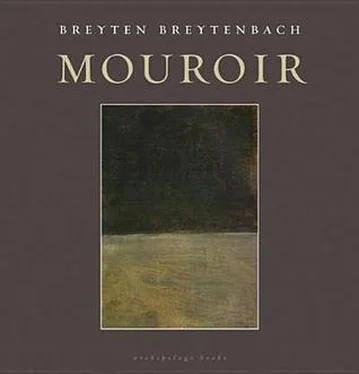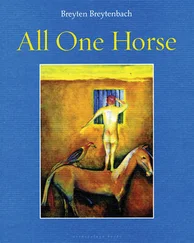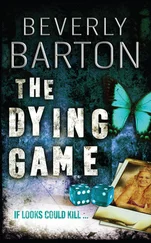Noordhoek Hedge was showing me his latest masterpiece, a book which he had just finished — for he made it his vocation to take published works (on any subject, but he was particularly fascinated by ontology) and modify them with a fine pen and black ink, sometimes word for word, till a completely new book was created, and always far better than the “original” or the “rough material” as he considered it to be. He was, you might say, stripping the cloak of petrifaction and convention off the work so that the little bones may glisten afresh. I was leafing through this most recent transfiguration and in places I had to catch my breath at the riskiness of some of his ideas — when quite unexpectedly there was the squeaking of the telephone. Very surprised we all looked up — Eva who was busy arranging her little hat (hardly bigger than an apple), because we were expecting to leave a while later, Eva literally remained standing just like that with her hands in her hair — since no one as far as we could tell could have known this number. The apparatus was only recently installed and as far as we were concerned not even connected yet; besides, the intention was to have it registered in the name of Dr Righton Ajax Foroek 6exactly to preserve the anonymity and to fool nuisance callers. Noordhoek Hedge got up with the heart’s flutter-dance over the brown skin of his skull (under the soft down some crusted blood still pointed a warning finger) and lifted the earpiece off its hook with a long stiff arm as if expecting at any moment to be bitten in the ear. Everyone held their breath; even the carpenter stopped chewing the nails in his mouth and expectantly turned his button-fat eyes to the telephone, hammer and chisel held high in the air.
In this silence we could clearly hear a female voice with a brackish American accent coming over the line — you surely know the sound: like someone playing the cornet without a mouthpiece. “Now y’all jest tell Dawn Espohwaylo that ah know he’s leavin’ with y’all this afte’noon for Bahlane to attend the Olympic Games. . ” I just could not believe the unearthly scratching. Who was this woman? How on earth did she know I — we — would be here? Why was she calling about me? How could she know that we’d be leaving that same afternoon for Burrlin (if wind and mud did not render the roads impassable) and indeed because we wanted to attend the regattas of the Games? “An’ ah know you’re there — you lissen to me, Deedah,” the blue-toned voice carried on, “Ah don’t an’ ah jest couldn’t give a. . a push for it!” There was a click followed by everyone’s speechless amazement. My wife, Meisie, turned her eyes with the dark fine targets so suddenly on me that the long black hair moved like a shadow-stain over the lilac-coloured scarf wrapped around the wounds of her neck. Damn! “Who is this woman?” she wanted to know as if she’d taken me red-handed. “Where do you know her from? Why don’t you admit that you know her? Was it perhaps an autograph she wanted?” One after another the staccato questions exploded like grapeshot around my ears and my defensive and disclaiming gestures apparently didn’t carry the slightest conviction. Wind started huffing stronger outside the dark window panes. In places it was wiping all along the walls but despite the pressure one could see the floppy wings and the little sucking paws of the first flies searching outside over the glass. And soon, led on by the fresh odour, they would find a crack somewhere. Firelight jumped in a reddish glow over the three neckerchiefs so that it looked as if underneath there might be something moving, moving. I could feel the black stuttering in the veins of my neck, and the clamminess between torso and shirt. Around me there was an erosion of light and over a long sad and long distance (behind the wind and behind the present) I heard my tight voice calling: “Oubaas! Ouba-á-á-á-ás!”
Once upon a time there was a man by the name of Lukas Percy Vermoken. Well, to be quite honest, he was first a foetus and then a baby and further still a boy before he changed into a man. He was delivered at 01h36 during the early part of the night and already at birth his hands were reddish. For his thirteenth birthday he was given a push bike and his nickname was Small Pears. A ribbon had been knotted around the handlebars of the bicycle. Some years after starting to work as a clerk (in a packing firm), he entered the state of marriage. His wife had one front tooth with a gold filling. The name of his second daughter was Magriet. As a hobby he collected postage stamps which, with reddish fingers, he arranged in albums, under transparent paper, and cats or dogs in the house gave him hay fever. During 1965 he visited, together with his wife and youngest son, the Kruger National Park. On 12 March 1969 he was promoted to assistant manager staff, the adjusted wages retroactive from beginning January. At his retirement he would most surely have received a silver wrist-watch, fittingly inscribed on the back. On holiday with in-laws in Williston he succumbed to cardiac failure. Fried chicken gizzards was one of his favourite dishes. “A silent tear we weep but know you’re in God’s keep; yeah, we shall ever live with the pain until we one day meet again.” Profoundly mourned by Hannetjie, Lukas (Boy), Sunara, Magriet and Freddie (son-in-law), Charles and Elefteria, brothers-in-law and sister. Burial arrangements by Human and Pitt.
The Introduction
At last I’ve found the solution to my problem. Or the excuse for a solution. This morning while brushing my teeth over the basin it suddenly dawned on me — simple: why would it need a so-called explanation or even the appearance of logical probability? And more: a presentation of this lack of reality-like exposition (especially at that important point of articulation in the narrative which is still a dark spot for me) presented precisely by means of this introduction, may perhaps indeed establish for the reader an acceptableness. For me too. And that is after all what it is about. You see, I do not mince matters.
For a long time the unfinished story haunted me. I wanted to be able to complete it because I was keen to fit it in with the other writings, get my characters in perspective, fill my notebook so as to be able to hand it in. One doesn’t get any younger. The flesh starts riding you bareback, drags you down towards the sods. In vain! Each time I reached the turning-point of the story — the shooting — how many shots were fired? and what was the relationship between the number of shots and the other premises again? — then I became rigid. The juices dried up. Was it simply a question of the pig-headed un-memory? Or is there a deeper-lying theme which escapes me and am I staring blindly at the variations? Should I arbitrarily have imposed on the course a given turn, thus forcing the whole set-up in another direction? But when you start tinkering with a little nut, apparently innocuous, the whole structure may unexpectedly come crashing around your ears. And in the name of what legality do I deposit my hesitations on any given totality? Until this morning then when I realized that I need not even concoct any credibility in the attempt to disguise my obtuseness or my forgetfulness. As long as I express it clearly right at the outset. I am the writer: I can do what I want!
L.L. told me the story in prison. (L.L., strangely enough, was not his true name — that belonged to a compatriot of his and after the latter’s “unexpected” demise, I’m told a violent one at that, in South-West, my narrator claimed it for himself — certainly with obscure criminal designs in mind. Besides, the deceased, who dies intestate, owed my narrator quite a large sum of black money. A teasing question remains with me: if my narrator was (co-)responsible for the untimely disappearance of the original L.L., why then hijack his identity? What kind of identification is that? That it may have an unforeseen and unpleasant sequel he already knew. Shortly before being arrested and sentenced two unknown persons in a motor car tried to force him off the speedway serpentining around the mountainside; during the ensuing mad chase, eventually right into the city, the back window of his car was shot to pieces. After the officers of law and order managed to obstruct their way and had taken them to the police station, it turned out to have been an instance of “mistaken identity”: the vengeance had been intended for another L. L. .)
Читать дальше












